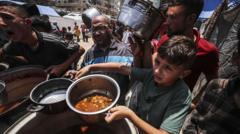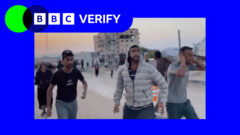As accusations of war crimes surface against Israel amidst its military operations in Gaza, global leaders face pressure to respond thoughtfully. The humanitarian crisis and potential legal ramifications present a complex challenge as voices from various perspectives call for accountability while grappling with historical contexts.
Israel's War Crimes Accusations: Global Reactions and Legal Implications

Israel's War Crimes Accusations: Global Reactions and Legal Implications
The recent escalation in the Israel-Palestine conflict has reignited serious allegations of war crimes, prompting international scrutiny and varied governmental responses.
In the midst of the ongoing Israel-Palestine conflict, the severity of human suffering and direct allegations of potential war crimes by Israel have compelled a range of international responses. The heightened military operations in Gaza following the attack initiated by Hamas on October 7, 2023, have led to tragic civilian casualties, igniting fervent discussions surrounding laws of war and humanitarian protections.
The Geneva Conventions, established to create frameworks for humane conduct in warfare, are being scrutinized, with international law experts and human rights activists arguing that both Israel and Hamas are failing to uphold these standards. The head of the International Committee of the Red Cross (ICRC) has explicitly noted this disregard for fundamental humanitarian rights, observing significant suffering in Gaza, where civilian lives hang in the balance.
At present, credible figures indicate that the Palestinian death toll exceeds 54,000, including thousands of children, compelling entities like UNICEF to voice grave humanitarian concerns. Compounded by restrictions on reporting in the area—a restriction enforced by Israel—there is uncertainty and discrepancy surrounding casualty counts, creating a fog of war that complicates any fact-checking initiatives. The absence of independent journalists in Gaza has raised alarm bells about the accurate conveyance of events, enabling narratives that avoid scrutiny or accountability.
Israel’s Prime Minister Benjamin Netanyahu faces mounting criticism both domestically and from international leaders regarding the disproportionate responses to the attacks on Israel. Amidst discussions of prolonging military engagements for political survival, many political analysts suggest that these decisions may further entrench accusations of war crimes, including those of genocide—charging that Israel's tactics could be construed as systematically targeting a civilian population through starvation and unyielding military force.
Western nations, traditionally supportive of Israel, find themselves at a crossroads. The UK, Canada, and France have recently issued statements regarding the need for accountability, as they grapple with balancing their historical alliances with the burgeoning concerns regarding humanitarian law violations. Discussions have arisen regarding potential sanctions against Israel if its actions continue unabated.
Furthermore, the specter of genocide allegations lingers, as presented in cases brought to the International Court of Justice by nations such as South Africa. These charges assert that Israel's military actions and the resulting plight of Palestinians may meet criteria for genocide under international law. This has led to substantial legal discussions about the extent of the conflict and what constitutes an acceptable military response.
In conclusion, the struggle in Gaza represents not only a humanitarian crisis but poses significant legal and moral dilemmas for governments responding to the conflict. As international condemnation and calls for accountability grow louder, the ramifications of these actions may extend far beyond the immediate region, impacting geopolitical stances for years to come. As the reality in Gaza continues to unfold, it remains unclear how the global community will reconcile its responses with the pressing need for adherence to international humanitarian law.
The Geneva Conventions, established to create frameworks for humane conduct in warfare, are being scrutinized, with international law experts and human rights activists arguing that both Israel and Hamas are failing to uphold these standards. The head of the International Committee of the Red Cross (ICRC) has explicitly noted this disregard for fundamental humanitarian rights, observing significant suffering in Gaza, where civilian lives hang in the balance.
At present, credible figures indicate that the Palestinian death toll exceeds 54,000, including thousands of children, compelling entities like UNICEF to voice grave humanitarian concerns. Compounded by restrictions on reporting in the area—a restriction enforced by Israel—there is uncertainty and discrepancy surrounding casualty counts, creating a fog of war that complicates any fact-checking initiatives. The absence of independent journalists in Gaza has raised alarm bells about the accurate conveyance of events, enabling narratives that avoid scrutiny or accountability.
Israel’s Prime Minister Benjamin Netanyahu faces mounting criticism both domestically and from international leaders regarding the disproportionate responses to the attacks on Israel. Amidst discussions of prolonging military engagements for political survival, many political analysts suggest that these decisions may further entrench accusations of war crimes, including those of genocide—charging that Israel's tactics could be construed as systematically targeting a civilian population through starvation and unyielding military force.
Western nations, traditionally supportive of Israel, find themselves at a crossroads. The UK, Canada, and France have recently issued statements regarding the need for accountability, as they grapple with balancing their historical alliances with the burgeoning concerns regarding humanitarian law violations. Discussions have arisen regarding potential sanctions against Israel if its actions continue unabated.
Furthermore, the specter of genocide allegations lingers, as presented in cases brought to the International Court of Justice by nations such as South Africa. These charges assert that Israel's military actions and the resulting plight of Palestinians may meet criteria for genocide under international law. This has led to substantial legal discussions about the extent of the conflict and what constitutes an acceptable military response.
In conclusion, the struggle in Gaza represents not only a humanitarian crisis but poses significant legal and moral dilemmas for governments responding to the conflict. As international condemnation and calls for accountability grow louder, the ramifications of these actions may extend far beyond the immediate region, impacting geopolitical stances for years to come. As the reality in Gaza continues to unfold, it remains unclear how the global community will reconcile its responses with the pressing need for adherence to international humanitarian law.


















